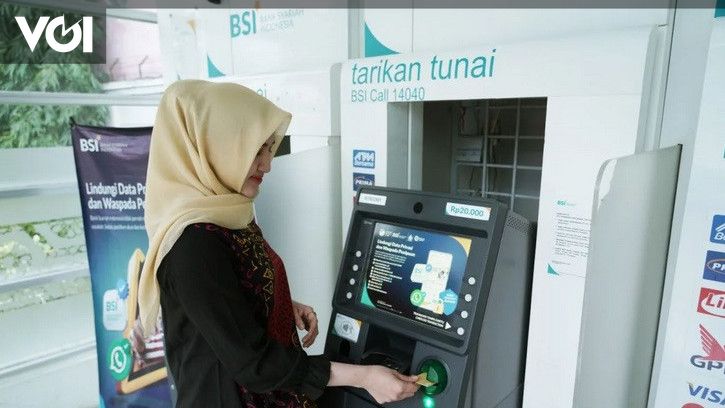JAKARTA The strategic cooperation relationship between the second largest Islamic organization in Indonesia, Muhammadiyah, and Bank Syariah Indonesia (BSI) is being tested. The reason is Muhammadiyah’s decision to withdraw deposit funds at BSI.
Muhammadiyah is not an ordinary mass organization, because it also has business entities engaged in education, hospitals, and charities. Therefore, the news of withdrawing funds at BSI became boisterous. Muhammadiyah’s plan to withdraw their funds at BSI began with a memo issued at the end of last May.
“With this, we ask for a rationalization of deposit funds and financing from BSI by transferring to Bank Syariah Bukopin, Bank Mega Syariah, Bank Muamalat and regional sharia banks as well as other banks that have been working with Muhammadiyah,” wrote the memo issued by Muhammadiyah.
In the memo, it was not stated how much nominal the funds Muhammadiyah would withdraw. However, according to the news circulating, the value reached more than Rp. 10 trillion.
Chairman of PP Muhammadiyah for Economic, Business and Halal Industry, Anwar Abbas, explained that this decision was based on considering the risk of too large a concentration of funds at BSI.
“Business, this can pose a risk of concentration. Meanwhile, in other Islamic banks, there are still few funds that are placed, so they cannot compete with the margin offered by BSI,” said Anwar Abbas in a written statement on June 6, 2024.
Responding to the news regarding Muhammadiyah’s decision to transfer funds, PT Bank Syariah Indonesia Corporate Secretary Tbk Wisnu Sunandar emphasized that BSI is always committed to serving and developing the people’s economy through collaborative efforts with strategic partners and stakeholders.
“Regarding the transfer of funds by PP Muhammadiyah, BSI is committed to continuing to become a strategic partner and is ready to collaborate with all stakeholders in an effort to develop various economic sectors of the people. Especially for micro, small and medium enterprises (MSMEs) which are the backbone of the nation’s economy,” said Wisnu.
Muhammadiyah’s decision to be a major Islamic organization in Indonesia to divert its funds from BSI cannot be seen as small. Mainly about the potential domino effect and the risk of concentration for BSI customers.
Not only business managing customer funds, banks are also a business that prioritizes the trust of customers. Muhammadiyah’s decision to withdraw funds at BSI has the potential to be followed by its followers, which is estimated to reach hundreds of millions throughout Indonesia.
Therefore, Banking observer and Payment System Practitionist Arianto Muditomo said this policy would have an impact on BSI, at least in the short term. The rise of news and comments will raise questions for customers of all segments.
The withdrawal of funds by Muhammadiyah is a big challenge for BSI. They must ensure the trust of customers or the public that their funds are safe at BSI.
Meanwhile, economist from the Center of Economic and Law Studies (Celios) Nailul Huda added that the withdrawal or transfer of Muhammadiyah funds at BSI should be an alarm for the state-owned company. With declining liquidity, it can triggerrush against other customers.
“This issue must be handled properly by BSI so as to convince other customers not to participate in withdrawing money from BSI,” he said.
Huda added that Muhammadiyah funds were quite large and had a strong turnaround with various business entities established, the impact would be immediately felt on liquidity and financing by BSI.
Selain itu, kemampuan pembiayaan BSI juga dikhawatirkan berkuran. Hal ini berpotensi pada menariknya pendapatan dari margin yang bisa menurun akibat kemampuan pembiayaan dari BSI.
“Actually, the intention is good for equitable funding at Islamic banks, but banks still need sufficient third party funds for liquidity and financing,” Huda added.
Muhammadiyah’s statement regarding the reasons for withdrawing funds at BSI was not swallowed up by the public. The public is still wondering about the reasons why the second largest Islamic organization in Indonesia withdrew its trillions of funds at BSI.
Although Muhammadiyah gave reasons for withdrawing the funds to mitigate financial risks, other news circulating stated that this decision was motivated by political matters.
BSI had previously asked BSI to include several names as the Sharia Supervisory Board and Commissioner of BSI. There are the names of Jaih Mubarak and Abdul Mu’ti who were proposed by Muhammadiyah as candidates for DPS and Commissioner of BSI.
However, based on the General Meeting of Shareholders (GMS) on May 17, 2024, BSI appointed Felicity Tallulumbang as commissioner, setting aside Abdul Mu’ti, the candidate offered by BSI. To note, Felicity Talulembang is a Gerindra politician.
A Syariah Business expert who is also an Economist at the University of Indonesia, Yusuf Wibisono, suspects that there is a connection between the withdrawal of Muhammadiyah funds at BSI and the appointment of Felicity Tallulembang as commissioner. Muhammadiyah itself still places its management in the Office of the Sharia Supervisory Board (DPS), namely Jaih Mubarok.
Yusuf said, in the election of commissioners, banks take into account stakeholder interests, namely shareholders or owners of large funds, one of which in this case is Muhammadiyah. However, BSI appointed Felicitas who was considered not to have a record track in the banking world, especially Islamic banks, even though Muhammidyah had members, qualified cadres in the field of Islamic banks.
“The government should not do excessive politicization of SOEs. This is a sign of why people who do not have records in banking, especially like sharia, suddenly become commissioners,” said Yusuf.
“In the future, SOEs must be managed more professionally, especially in the board of directors and commissioners so that they fully reflect business needs, the needs of Islamic banking efforts. They are no longer infiltrated or boarded by short-term political interests,” he concluded.
Tag:
bank syariah indonesia
bsi
muhammadiyah


